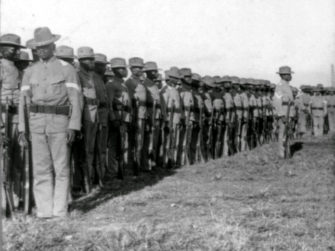
In Michel Foucault’s series of 1970s lectures, “Society Must Be Defended,” the French author describes a transition regarding political power’s capacity to hold sway over life and death, a shift from sovereignty to biopower. According to Foucault, sovereign power over life is exercised through the right to kill, i.e. to take life, while biopower involves the right to create life, to regulate populations, and to manage variation and randomness (244–46). Even though he suggests that sovereign power is on the decline, he also contends that modern racism exists at the intersection of sovereignty and biopolitics. Racism is how the state creates a break between those who deserve to live and those populations that must die. It is what makes killing acceptable, and what allows certain bodies to be positioned closer to (social) death in the name of preserving the life and health of the social order. As Foucault puts it, “If the power of normalization wished to exercise the sovereign right to kill, it must become racist” (256). While Foucault’s discussion of racism is motivated by the ascendance of the Nazis in twentieth-century Europe, he reminds his audience that “racism first develops with colonization, or in other words, with colonizing genocide” (257). As such, any understanding of how sovereignty remains and operates alongside biopolitics must traverse colonial modernity and its enduring legacy.
Foucault’s reflections on sovereignty, violence, and racism generate a series of questions and queries. Beyond the “right to kill,” what is the relationship between sovereign power and coloniality, or more specifically the sovereign and the slave? Does the general conception of sovereignty change when we shift from Europe to other spaces and contexts, when we refuse to only think with authors like Foucault, the German jurist Carl Schmitt, and the political theorist and philosopher Giorgio Agamben? When Cedric Robinson introduces the notion of black sovereignty, what does the modifier “black” accomplish? What aspects of sovereign power does blackness unsettle and reconfigure? Why should religious studies scholars be interested in the fraught relationship between blackness and sovereignty, especially as it has been expressed in unfamiliar spaces and discourses? In what follows, I respond to these questions with some sketches and lines of flight.
…any understanding of how sovereignty remains and operates alongside biopolitics must traverse colonial modernity and its enduring legacy.
Foucault’s conception of sovereign power invokes the writings of Schmitt, who develops a similar idea in his oft-cited text, Political Theology. According to Schmitt, the “sovereign is he who decides on the exception” and is therefore “associated with the borderline case and not with routine” (5). Against formal and legalist conceptions of political power, Schmitt underscores the concreteness of the particular case that the sovereign ruler must decide on and act against. And since all political categories for Schmitt are “secularized theological concepts,” the “exception in jurisprudence is analogous to the miracle in theology” (36). The exception lies at the edge of the existing legal order; it is associated with “extreme peril,” danger to the state’s existence, and various states of emergency. In response to these moments of danger, the sovereign has the authority to decide whether normal law will be extended or suspended and the authority to conscript subjects to kill and die for the state. Consequently, sovereignty exists within and outside the law; paradoxically, “although he stands outside the normally valid legal system, he nevertheless belongs to it” (7). And yet even as the sovereign’s decision occurs at the parameters of the law, this exceptional act operates according to a certain logic of preservation. The exception, in other words, is always already consigned to the principles of protection and obedience, to the territorial state’s need to maintain order against the threat of anarchy and chaos.
As many authors have demonstrated, the grammar of sovereignty, law, and exception has direct implications for thinking about race, slavery, and settler colonialism—political and social arrangements that place the darker denizens of modernity at the edges of the law and human recognition. Walter Benjamin anticipates some of these contemporary discussions when he writes, “The tradition of the oppressed teaches us the state of emergency in which we live is not the exception but the rule” (392). A German Jew writing in response to the Nazi takeover in Germany, the confiscation of citizenship from Jews in Germany, the systematic endeavor to exterminate European Jews, and the Soviet-German non-aggression pact in 1939, Benjamin supplements and revises Schmitt’s conception of the state of emergency. From the perspective of the oppressed, Benjamin suggests, crisis is the norm. From the perspective of the dispossessed, being positioned at the edges of the law is constitutive and not an aberration; being the targets of state (and other forms of) violence is the mundane condition of possibility for order and rule. If Schmitt’s sovereign is authorized to act and make decisions outside the law in a moment of peril, Benjamin indicates that treating certain populations as threatening forces that require suppression, and the suspension of norms and laws, is all too normal.
Black radical practice revises, reinterprets, and in some cases refuses the logic of sovereignty.
George Shulman makes a similar intervention into these discussions about sovereign power and the exception, dealing with these matters in the context of US slavery and anti-black racism. According to Schulman, the racial order in the United States is a secularized political theology. Whiteness is associated with redemption and wholeness while blackness is condemned; blacks, Native peoples, and other groups have embodied the racialized exceptions to liberal norms and principles. On this reading, national sovereignty and belonging are constituted and solidified by creating racialized frontiers and exceptions. As Shulman puts it, “The racial state of exception in American liberalism is constitutive not anomalous, permanent not temporary” (28). In opposition to this predicament, as Shulman describes, black thinkers and critics like James Baldwin and Toni Morrison have gestured toward alternative forms of sovereignty. Exemplified by the tradition of black prophecy, these are self-authorizing practices and modes of resistance that cannot be contained within the law, formal politics, or stable boundaries, like the sacred and the secular. This uncontainable excess is not the occasion for re-establishing order but a call for an interruption, a break with the order of things.
What Shulman refers to as “countersovereignty” resembles Cedric Robinson’s terse allusions to black sovereignty. Robinson’s affirmation of black sovereignty is an extension of his broader formulation of the black radical tradition. This is a constellation of practices extended in time that have been forged in the crucible of “racial capitalism,” a term that Robinson uses to register how the expansion of capital is mediated and made possible by racial hierarchies (making some populations more exploitable and disposable than others). Exemplified by slave rebellions, fugitive slave communities, anti-racist and anti-imperial activism, aesthetic and literary creations, and the remaking of African-derived religious practices in the Americas, the black radical tradition is a disruptive intervention into Western civilization and its reigning logics and operations. As Robinson puts it, “Black radicalism critically emerges from African culture, languages, and beliefs, and enslavement. What emerged from that conjunction were powerful impulses to escape enslavement” (3). Here escape refers to the desires and strategies of actual slaves in places like Jamaica and Brazil, but also to ongoing endeavors, in the aftermath of slavery, to resist and abscond renewed forms of anti-blackness and containment.

Black radical practice revises, reinterprets, and in some cases refuses the logic of sovereignty. Insofar as sovereign power, in the context of chattel slavery and settler coloniality, has been associated with mastery (including the unlimited power of the master over the slave), territorial expansion, and the accumulation of property, Robinson suggests that black sovereignty offers something different. On his reading, black sovereignty is a “plague” to Western sensibilities and aspirations. He points, for instance, to maroon communities and republics formed by fugitive slaves, modes of inhabitation that were temporary and ephemeral and that subsisted at the edges of official settlements. He mentions the Haitian Revolution and the fear that this protracted slave rebellion against European powers invoked in US slave masters. Robinson also offers as an example of black sovereignty the defection of black American troops during the 1899 war in the Philippines and these soldiers’ decision to join Philippine independent armies. In this particular case, an extra-legal decision is made within and against imperial sovereignty and in solidarity with the targets of America’s imperial projects. In all of these cases, black sovereignty is inseparable from loss, precarious achievements, failure, instability, movement, conversion, and a kind of excess that refuses to be assimilated into the operations and protocols of racial capitalism.
Another image that Robinson offers is a scene from Julie Dash’s 1991 film, Daughters of the Dust, a film about a Gullah community living on Igbo Landing off the coast of Georgia. In this scene, one of the characters, Eula, tells a story about her African ancestors who were brought across the Atlantic Ocean in chains but refused to accept a future of enslavement; instead they turned around and walked back into the ocean. While Robinson reads this moment as an example of liberation, we might also see traces of black sovereignty. If Hegel’s famous Master/Slave, or Sovereign/Slave, relationship is made possible because the slave fears death, and chooses submission over death, then Eula’s ancestors instantiate a form of liberation through death. Conjuring the trope of the flying home slave, this scene in Daughters connects flight with dissolution, home with the oceanic (or the edges of the ocean and settled land [1]), and sovereignty with the right to take one’s own life, to make one’s life unproductive for the master and settler. And yet this escape through death is not incompatible with a life that lingers on through memory, story, mourning, and honoring the ancestors.[2] What we might infer from Robinson and Dash is that black sovereignty takes the power associated with the sovereign to its limits, without the Schmittian demand to recuperate order. This edge points to a moment of collapse and falling, when sovereignty would have to become something else—vulnerability, exposure, entanglement, and what Jared Sexton calls the unsovereign.
Those of us interested in religion, race, and coloniality, in decolonizing religious studies, should be invested in tracking the afterlife of sovereignty. This task does not need to be motivated by the desire to show that the secular world is simply parasitic on Christian theology. And yet it should aim at interrogating how recurring tropes, figures, and paradigms, in both their religious and secular expressions, have been devastating for those on the darker side of the color line. In addition, religious studies scholars can examine how idioms like sovereign power, exception, and excess have been re-enacted, contested, and refused in spaces and contexts that we don’t often look to for theoretical insights.
[1] Here I am indebted to Tiffany King’s work and her use of the term “shoal” to think at the intersection of slavery and settler colonial projects.
[2] See for instance LeRhonda S. Mannigault-Bryant, Talking to the Dead: Religion, Music, and Lived Memory among Gullah/Geechee Woman (Durham: Duke University Press, 2014).

